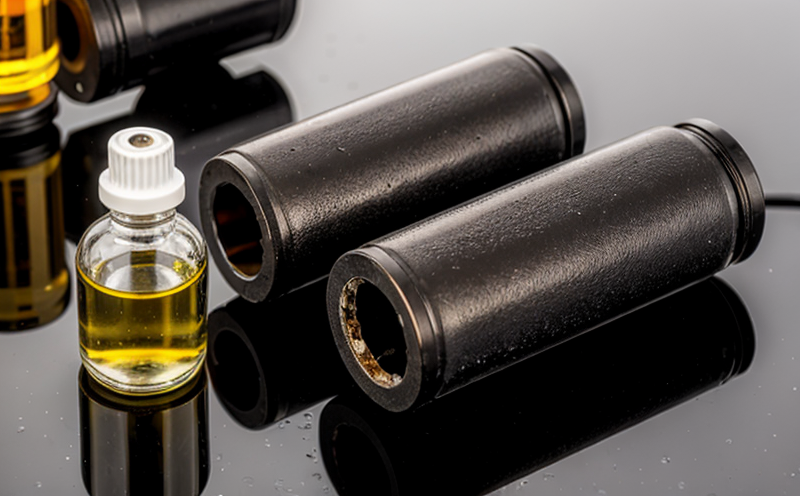ASTM D7679 Petroleum Hydrocarbons GC FID Test in Water
The ASTM D7679 test method is a widely recognized standard used to determine petroleum hydrocarbon concentrations in water. This method utilizes gas chromatography with flame ionization detection (GC-FID) for accurate quantification of the total petroleum hydrocarbons (TPH) and individual components within the sample.
This testing procedure is crucial for ensuring compliance with environmental regulations, particularly when assessing contaminated water sources or monitoring remediation efforts. The test method is applicable to various types of water samples including surface water, ground water, and wastewater from industrial processes that may involve hydrocarbon contamination.
The GC-FID system separates the petroleum components based on their boiling points, allowing for precise identification and quantification of each constituent present in the sample. This makes it a powerful tool for identifying specific types of hydrocarbons, which is critical in determining sources of pollution or evaluating treatment effectiveness.
Sample preparation plays a key role in achieving accurate results with ASTM D7679. Properly collected water samples must be filtered to remove particulate matter and other non-target analytes. The filtrate is then analyzed using the GC-FID system after dilution if necessary to bring it within the linear range of detection.
The test method specifies strict temperature, flow rate, and column conditions for optimal separation efficiency. Calibration standards are prepared according to ASTM D7679 guidelines, ensuring accurate quantification across all tested concentrations. Quality control measures include regular verification with certified reference materials (CRMs) provided by recognized sources such as NIST.
The results from the ASTM D7679 GC-FID test provide valuable information for stakeholders involved in environmental management and regulatory compliance. These data help identify areas requiring immediate attention or long-term monitoring, informing decisions about remediation strategies and resource allocation.
For quality managers responsible for maintaining clean water standards, understanding these analytical techniques is essential. By leveraging advanced methods like ASTM D7679, organizations can ensure their operations comply with both local and international environmental protection laws.
In summary, the ASTM D7679 GC-FID test offers a robust solution for detecting petroleum hydrocarbons in water samples. Its high level of precision enables detailed analysis that supports informed decision-making processes across industries dealing with potential hydrocarbon contamination issues.
Scope and Methodology
The ASTM D7679 test method covers the procedure for determining total petroleum hydrocarbons (TPH) in water using gas chromatography with flame ionization detection (GC-FID). The scope includes the preparation of calibration solutions, sample collection, filtration procedures, instrumental setup, and interpretation of results.
- Calibration Solutions: Calibration standards are prepared according to specified concentration ranges. These solutions serve as references for quantifying unknown samples during the analysis process.
- Sample Collection & Filtration: Samples should be collected from representative locations within the water body or point source being tested. Particulate matter is removed by filtering the sample through appropriate filters prior to analysis.
- Instrumental Setup: The GC-FID system requires careful configuration including column selection, temperature programming, and flow settings tailored to optimize separation of petroleum components.
- Data Interpretation: Peak areas obtained from the chromatogram are integrated, and concentrations are calculated based on calibration curves. Reporting includes both total TPH levels as well as individual component breakdowns when applicable.
The methodology outlined in ASTM D7679 ensures consistent results across different laboratories performing this type of analysis. Compliance with these procedures guarantees accurate quantification of petroleum hydrocarbons, which is vital for meeting regulatory requirements and protecting public health.
Why Choose This Test
- Regulatory Compliance: Ensures adherence to national and international environmental protection laws concerning hydrocarbon contamination in water.
- Precision Analysis: Offers high-resolution separation of petroleum components allowing for precise identification and quantification even at low concentrations.
- Comprehensive Reporting: Provides not just total TPH levels but also detailed breakdowns into individual components, aiding comprehensive understanding of the sample composition.
The ASTM D7679 GC-FID test is preferred by quality managers and compliance officers due to its reliability and accuracy. It allows for effective monitoring of water quality and supports informed decision-making regarding resource allocation and remediation strategies.
Customer Impact and Satisfaction
Customers who choose ASTM D7679 GC-FID testing benefit from robust data that informs critical decisions related to environmental protection. Our comprehensive approach ensures high levels of customer satisfaction by delivering accurate, timely results supported by detailed reports.
Our team works closely with clients to understand their unique needs and challenges, tailoring each project accordingly. This collaborative process leads to more effective solutions tailored specifically for our customers' requirements.





